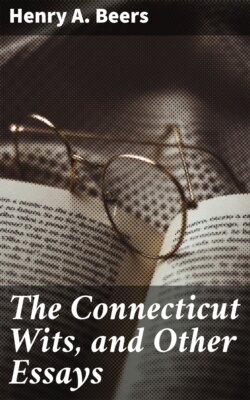Читать книгу The Connecticut Wits, and Other Essays - Henry A. Beers - Страница 4
На сайте Литреса книга снята с продажи.
THE SINGER OF THE OLD SWIMMIN’ HOLE
ОглавлениеTable of Contents
MANY years ago I said to one of Walt Whitman’s biographers: “Whitman may, as you claim, be the poet of democracy, but he is not the poet of the American people. He is the idol of a literary culte. Shall I tell you who the poet of the American people is just at present? He is James Whitcomb Riley of Indiana.” Riley used to become quite blasphemous when speaking of Whitman. He said that the latter had begun by scribbling newspaper poetry of the usual kind—and very poor of its kind—which had attracted no attention and deserved none. Then he suddenly said to himself: “Go to! I will discard metre and rhyme and write something startlingly eccentric which will make the public sit up and take notice. I will sound my barbaric yawp over the roofs of the world, and the world will say—as in fact it did—‘here is a new poetry, lawless, virile, democratic. It is so different from anything hitherto written, that here must be the great American poet at last.’ ”
Now, I am not going to disparage old Walt. He was big himself, and he had an extraordinary feeling of the bigness of America with its swarming multitudes, millions of the plain people, whom God must have loved, said Lincoln, since he made so many of them. But all this in the mass. As to any dramatic power to discriminate among individuals and characterize them singly, as Riley does, Whitman had none. They are all alike, all “leaves of grass.”
Well, my friend, and Walt Whitman’s, promised to read Riley’s poems. And shortly I got a letter from him saying that he had read them with much enjoyment, but adding, “Surely you would not call him a great national poet.” Now since his death, the newspaper critics have been busy with this question. His poetry was true, sweet, original; but was it great? Suppose we leave aside for the moment this question of greatness. Who are the great poets, anyway? Was Robert Burns one of them? He composed no epics, no tragedies, no high Pindaric odes. But he made the songs of the Scottish people, and is become a part of the national consciousness of the race. In a less degree, but after the same fashion, Riley’s poetry has taken possession of the popular heart. I am told that his sales outnumber Longfellow’s. This is not an ultimate test, but so far as it goes it is a valid one.
Riley is the Hoosier poet, but he is more than that: he is a national poet. His state and his city have honored themselves in honoring him and in keeping his birthday as a public holiday. The birthdays of nations and of kings and magistrates have been often so kept. We have our fourth of July, our twenty-second of February, our Lincoln’s birthday; and we had a close escape from having a McKinley day. I do not know that the banks are closed and the children let out of school—Riley’s children, for all children are his—on each succeeding seventh of October; but I think there is no record elsewhere in our literary history of a tribute so loving and so universal to a mere man of letters, as the Hoosier State pays annually to its sweet singer. Massachusetts has its poets and is rightly proud of them, but neither Bryant nor Emerson nor Lowell nor Holmes, nor the more popular Longfellow or Whittier, has had his natal day marked down on the calendar as a yearly state festa. And yet poets, novelists, playwriters, painters, musical composers, artists of all kinds, have added more to the sum of human happiness than all the kings and magistrates that ever lived. Perhaps Indianians are warmer hearted than New Englanders; or perhaps they make so much of their poets because there are fewer of them. But this is not the whole secret of it. In a sense, Riley’s poems are provincial. They are intensely true to local conditions, local scenery and dialect, childish memories and the odd ways and characters of little country towns. But just for this faithfulness to their environment these “poems here at home” come home to others whose homes are far away from the Wabash, but are not so very different after all.
America, as has often been said, is a land of homes: of dwellers in villages, on farms, and in small towns. We are common people, middle-class people, conservative, decent, religious, tenacious of old ways, home-keeping and home-loving. We do not thrill to Walt Whitman’s paeans to democracy in the abstract; but we vibrate to every touch on the chord of family affections, of early friendships, and of the dear old homely things that our childhood knew. Americans are sentimental and humorous; and Riley abounds in sentiment—wholesome sentiment—and natural humor, while Whitman had little of either.
To all Americans who were ever boys; to all, at least who have had the good luck to be country boys and go barefoot; whether they dwell in the prairie states of the Middle West, or elsewhere, the scenes and characters of Riley’s poems are familiar: Little Orphant Annie and the Raggedy Man, and the Old Swimmin’ Hole and Griggsby’s Station “where we ust to be so happy and so pore.” They know when the frost is on the “punkin,” and that the “Gobble-uns’ll git you ef you don’t watch out”; and how the old tramp said to the Raggedy Man:—
